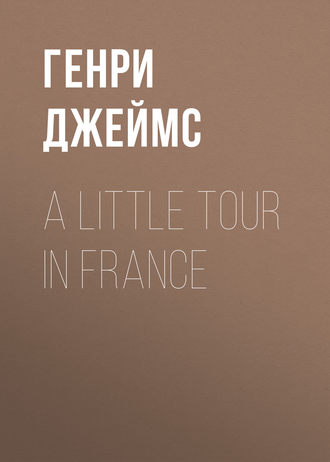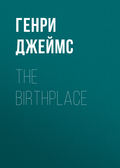
Генри Джеймс
A Little Tour in France
XXIX
On my way from Nimes to Arles, I spent three hours at Tarascon; chiefly for the love of Alphonse Daudet, who has written nothing more genial than "Les Aventures Prodigieuses de Taitarin," and the story of the "siege" of the bright, dead little town (a mythic siege by the Prussians) in the "Conies du Lundi." In the introduction which, for the new edition of his works, he has lately supplied to "Tar- tarin," the author of this extravagant but kindly satire gives some account of the displeasure with which he has been visited by the ticklish Tarascon- nais. Daudet relates that in his attempt to shed a humorous light upon some of the more erratic phases of the Provencal character, he selected Tarascon at a venture; not because the temperament of its natives is more vainglorious than that of their neighbors, or their rebellion against the "despotism of fact" more marked, but simply because he had to name a par- ticular Provencal city. Tartarin is a hunter of lions and charmer of women, a true "produit du midi," as Daudet says, who has the most fantastic and fabulous adventures. He is a minimized Don Quixote, with much less dignity, but with equal good faith; and the story of his exploits is a little masterpiece of the light comical. The Tarasconnais, however, declined to take the joke, and opened the vials of their wrath upon the mocking child of Nimes, who would have been better employed, they doubtless thought, in show- ing up the infirmities of his own family. I am bound to add that when I passed through Tarascon they did not appear to be in the least out of humor. Nothing could have been brighter, softer, more suggestive of amiable indifference, than the picture it presented to my mind. It lies quietly beside the Rhone, looking across at Beaucaire, which seems very distant and in- dependent, and tacitly consenting to let the castle of the good King Rene of Anjou, which projects very boldly into the river, pass for its most interesting feature. The other features are, primarily, a sort of vivid sleepi- ness in the aspect of the place, as if the September noon (it had lingered on into October) lasted longer there than elsewhere; certain low arcades, which make the streets look gray and exhibit empty vistas; and a very curious and beautiful walk beside the Rhone, denominated the Chaussee, – a long and narrow cause- way, densely shaded by two rows of magnificent old trees, planted in its embankment, and rendered doubly effective, at the moment I passed over it, by a little train of collegians, who had been taken out for mild exercise by a pair of young priests. Lastly, one may say that a striking element of Tarascon, as of any town that lies on the Rhone, is simply the Rhone itself: the big brown flood, of uncertain temper, which has never taken time to forget that it is a child of the mountain and the glacier, and that such an origin carries with it great privileges. Later, at Avignon, I observed it in the exercise of these privileges, chief among which was that of frightening the good people of the old papal city half out of their wits.
The chateau of King Rene serves to-day as the prison of a district, and the traveller who wishes to look into it must obtain his permission at the Mairie of Tarascon. If he have had a certain experience of French manners, his application will be accompanied with the forms of a considerable obsequiosity, and in this case his request will be granted as civilly as it has been made. The castle has more of the air of a severely feudal fortress than I should suppose the period of its construction (the first half of the fifteenth century) would have warranted; being tremendously bare and perpendicular, and constructed for comfort only in the sense that it was arranged for defence. It is a square and simple mass, composed of small yellow stones, and perched on a pedestal of rock which easily commands the river. The building has the usual cir- cular towers at the corners, and a heavy cornice at the top, and immense stretches of sun-scorched wall, relieved at wide intervals by small windows, heavily cross-barred. It has, above all, an extreme steepness of aspect; I cannot express it otherwise. The walls are as sheer and inhospitable as precipices. The castle has kept its large moat, which is now a hollow filled with wild plants. To this tall fortress the good Rene retired in the middle of the fifteenth century, finding it apparently the most substantial thing left him in a dominion which had included Naples and Sicily, Lorraine and Anjou. He had been a much-tried monarch and the sport of a various fortune, fighting half his life for thrones he didn't care for, and exalted only to be quickly cast down. Provence was the country of his affection, and the memory of his troubles did not prevent him from holding a joyous court at Tarascon and at Aix. He finished the castle at Tarascon, which had been begun earlier in the century, – finished it, I suppose, for consistency's sake, in the manner in which it had originally been designed rather than in accordance with the artistic tastes that formed the consolation of his old age. He was a painter, a writer, a dramatist, a modern dilettante, addicted to private theatricals. There is something very attractive in the image that he has imprinted on the page of history. He was both clever and kind, and many reverses and much suffering had not imbittered him nor quenched his faculty of enjoyment. He was fond of his sweet Provence, and his sweet Provence has been grateful; it has woven a light tissue of legend around the memory of the good King Rene.
I strolled over his dusky habitation – it must have taken all his good-humor to light it up – at the heels of the custodian, who showed me the usual number of castle-properties: a deep, well-like court; a collection of winding staircases and vaulted chambers, the embra- sures of whose windows and the recesses of whose doorways reveal a tremendous thickness of wall. These things constitute the general identity of old castles; and when one has wandered through a good many, with due discretion of step and protrusion of head, one ceases very much to distinguish and remember, and contents one's self with consigning them to the honorable limbo of the romantic. I must add that this reflection did not the least deter me from crossing the bridge which connects Tarascon with Beaucaire, in order to examine the old fortress whose ruins adorn the latter city. It stands on a foundation of rock much higher than that of Tarascon, and looks over with a melancholy expression at its better-conditioned brother. Its position is magnificent, and its outline very gallant. I was well rewarded for my pilgrimage; for if the castle of Beaucaire is only a fragment, the whole place, with its position and its views, is an ineffaceable picture. It was the stronghold of the Montmorencys, and its last tenant was that rash Duke Francois, whom Richelieu, seizing every occasion to trample on a great noble, caused to be beheaded at Toulouse, where we saw, in the Capitol, the butcher's knife with which the cardinal pruned the crown of France of its thorns. The castle, after the death of this victim, was virtually demolished. Its site, which Nature to-day has taken again to herself, has an extraordinary charm. The mass of rock that it formerly covered rises high above the town, and is as precipitous as the side of the Rhone. A tall rusty iron gate admits you from a quiet corner of Beaucaire to a wild tangled garden, covering the side of the hill, – for the whole place forms the public promenade of the townsfolk, – a garden without flowers, with little steep, rough paths that wind under a plantation of small, scrubby stone-pines. Above this is the grassy platform of the castle, enclosed on one side only (toward the river) by a large fragment of wall and a very massive dungeon. There are benches placed in the lee of the wall, and others on the edge of the platform, where one may enjoy a view, beyond the river, of certain peeled and scorched undulations. A sweet desolation, an everlasting peace, seemed to hang in the air. A very old man (a fragment, like the castle itself) emerged from some crumbling corner to do me the honors, – a very gentle, obsequious, tottering, toothless, grateful old man. He beguiled me into an ascent of the solitary tower, from which you may look down on the big sallow river and glance at diminished Tarascon, and the barefaced, bald-headed hills behind it. It may appear that I insist too much upon the nudity of the Provencal horiion, – too much, considering that I have spoken of the prospect from the heights of Beaucaire as lovely. But it is an exquisite bareness; it seems to exist for the purpose of allowing one to follow the de- licate lines of the hills, and touch with the eyes, as it were, the smallest inflections of the landscape. It makes the whole thing seem wonderfully bright and pure.
Beaucaire used to be the scene of a famous fair, the great fair of the south of France. It has gone the way of most fairs, even in France, where these delight- ful exhibitions hold their own much better than might be supposed. It is still held in the month of July; but the bourgeoises of Tarascon send to the Magasin du Louvre for their smart dresses, and the principal glory of the scene is its long tradition. Even now, however, it ought to be the prettiest of all fairs, for it takes place in a charming wood which lies just beneath the castle, beside the Rhone. The booths, the barracks, the platforms of the mountebanks, the bright-colored crowd, diffused through this midsummer shade, and spotted here and there with the rich Provencal sun- shine must be of the most pictorial effect. It is highly probable, too, that it offers a large collection of pretty faces; for even in the few hours that I spent at Tarascon I discovered symptoms of the purity of feature for which the women of the pays d'Arles are renowned. The Arlesian head-dress, was visible in the streets; and this delightful coiffure is so associated with a charming facial oval, a dark mild eye, a straight Greek nose, and a mouth worthy of all the rest, that it conveys a presumption of beauty which gives the wearer time either to escape or to please you. I have read somewhere, however, that Tarascon is supposed to produce handsome men, as Arles is known to deal in handsome women. It may be that I should have found the Tarasconnais very fine fellows, if I had en- countered enough specimens to justify an induction. But there were very few males in the streets, and the place presented no appearance of activity. Here and there the black coif of an old woman or of a young girl was framed by a low doorway; but for the rest, as I have said, Tarascon was mostly involved in a siesta. There was not a creature in the little church of Saint Martha, which I made a point of visiting before I re- turned to the station, and which, with its fine Romanesque sideportal and its pointed and crocketed Gothic spire, is as curious as it need be, in view of its tradition. It stands in a quiet corner where the grass grows between the small cobble-stones, and you pass beneath a deep archway to reach it. The tradition relates that Saint Martha tamed with her own hands, and attached to her girdle, a dreadful dragon, who was known as the Tarasque, and is reported to have given his name to the city on whose site (amid the rocks which form the base of the chateau) he had his cavern. The dragon, perhaps, is the symbol of a ravening paganism, dis- pelled by the eloquence of a sweet evangelist. The bones of the interesting saint, at all events, were found, in the eleventh century, in a cave beneath the spot on which her altar now stands. I know not what had be- come of the bones of the dragon.
XXX
There are two shabby old inns at Arles, which compete closely for your custom. I mean by this that if you elect to go to the Hotel du Forum, the Hotel du Nord, which is placed exactly beside it (at a right angle) watches your arrival with ill-concealed dis- approval; and if you take the chances of its neighbor, the Hotel du Forum seems to glare at you invidiously from all its windows and doors. I forget which of these establishments I selected; whichever it was, I wished very much that, it had been the other. The two stand together on the Place des Hommes, a little public square of Arles, which somehow quite misses its effect. As a city, indeed, Arles quite misses its effect in every way; and if it is a charming place, as I think it is, I can hardly tell the reason why. The straight-nosed Arlesiennes account for it in some degree; and the remainder may be charged to the ruins of the arena and the theatre. Beyond this, I remember with affection the ill-proportioned little Place des Hommes; not at all monumental, and given over to puddles and to shabby cafes. I recall with tenderness the tortuous and featureless streets, which looked like the streets of a village, and were paved with villanous little sharp stones, making all exercise penitential. Consecrated by association is even a tiresome walk that I took the evening I arrived, with the purpose of obtaining a view of the Rhone. I had been to Arles before, years ago, and it seemed to me that I remembered finding on the banks of the stream some sort of picture. I think that on the evening of which I speak there was a watery moon, which it seemed to me would light up the past as well as the present. But I found no pic- ture, and I scarcely found the Rhone at all. I lost my way, and there was not a creature in the streets to whom I could appeal. Nothing could be more pro- vincial than the situation of Arles at ten o'clock at night. At last I arrived at a kind of embankment, where I could see the great mud-colored stream slip- ping along in the soundless darkness. It had come on to rain, I know not what had happened to the moon, and the whole place was anything but gay. It was not what I had looked for; what I had looked for was in the irrecoverable past. I groped my way back to the inn over the infernal cailloux, feeling like a dis- comfited Dogberry. I remember now that this hotel was the one (whichever that may be) which has the fragment of a Gallo-Roman portico inserted into one of its angles. I had chosen it for the sake of this ex- ceptional ornament. It was damp and dark, and the floors felt gritty to the feet; it was an establishment at which the dreadful gras-double might have appeared at the table d'hote, as it had done at Narbonne. Never- theless, I was glad to get back to it; and nevertheless, too, – and this is the moral of my simple anecdote, – my pointless little walk (I don't speak of the pave- ment) suffuses itself, as I look back upon it, with a romantic tone. And in relation to the inn, I suppose I had better mention that I am well aware of the in- consistency of a person who dislikes the modern cara- vansary, and yet grumbles when he finds a hotel of the superannuated sort. One ought to choose, it would seem, and make the best of either alternative. The two old taverns at Arles are quite unimproved; such as they must have been in the infancy of the modern world, when Stendhal passed that way, and the lum- bering diligence deposited him in the Place des Hommes, such in every detail they are to-day. Vieilles auberges de France, one ought to enjoy their gritty floors and greasy window-panes. Let it be put on re- cord, therefore, that I have been, I won't say less com- fortable, but at least less happy, at better inns.
To be really historic, I should have mentioned that before going to look for the Rhone I had spent part of the evening on the opposite side of the little place, and that I indulged in this recreation for two definite reasons. One of these was that I had an opportunity of conversing at a cafe with an attractive young Eng- lishman, whom I had met in the afternoon at Tarascon, and more remotely, in other years, in London; the other was that there sat enthroned behind the counter a splendid mature Arlesienne, whom my companion and I agreed that it was a rare privilege to contem- plate. There is no rule of good manners or morals which makes it improper, at a cafe, to fix one's eyes upon the dame de comptoir; the lady is, in the nature of things, a part of your consommation. We were there- fore feee to admire without restriction the handsomest person I had ever seen give change for a five-franc piece. She was a large quiet woman, who would never see forty again; of an intensely feminine type, yet wonderfully rich and robust, and full of a certain phy- sical nobleness. Though she was not really old, she was antique, and she was very grave, even a little sad. She had the dignity of a Roman empress, and she handled coppers as if they had been stamped with the head of Caesar. I have seen washerwomen in the Trastevere who were perhaps as handsome as she; but even the head-dress of the Roman contadina con- tributes less to the dignity of the person born to wear it than the sweet and stately Arlesian cap, which sits at once aloft and on the back of the head; which is accompanied with a wide black bow covering a con- siderable part of the crown; and which, finally, accom- modates itself indescribably well to the manner in which the tresses of the front are pushed behind the cars.
This admirable dispenser of lumps of sugar has distracted me a little; for I am still not sufficiently historical. Before going to the cafe I had dined, and before dining I had found time to go and look at the arena. Then it was that I discovered that Arles has no general physiognomy, and, except the delightful little church of Saint Trophimus, no architecture, and that the rugosities of its dirty lanes affect the feet like knife-blades. It was not then, on the other hand, that I saw the arena best. The second day of my stay at Arles I devoted to a pilgrimage to the strange old hill town of Les Baux, the mediaeval Pompeii, of which I shall give myself the pleasure of speaking. The even- ing of that day, however (my friend and I returned in time for a late dinner), I wandered among the Roman remains of the place by the light of a magnificent moon, and gathered an impression which has lost little of its silvery glow. The moon of the evening before had been aqueous and erratic; but if on the present occasion it was guilty of any irregularity, the worst it did was only to linger beyond its time in the heavens, in order to let us look at things comfortably. The effect was admirable; it brought back the impression of the way, in Rome itself, on evenings like that, the moonshine rests upon broken shafts and slabs of an- tique pavement. As we sat in the theatre, looking at the two lone columns that survive – part of the decora- tion of the back of the stage – and at the fragments of ruin around them, we might have been in the Roman forum. The arena at Arles, with its great magnitude, is less complete than that of Nimes; it has suffered even more the assaults of time and of the children of time, and it has been less repaired. The seats are almost wholly wanting; but the external walls minus the topmost tier of arches, are massively, rug- gedly, complete; and the vaulted corridors seem as solid as the day they were built. The whole thing is superbly vast, and as monumental, for place of light amusement – what is called in America a "variety- show" – as it entered only into the Roman mind to make such establishments. The podium is much higher than at Nimes, and many of the great white slabs that faced it have been recovered and put into their places. The proconsular box has been more or less recon- structed, and the great converging passages of approach to it are still majestically distinct: so that, as I sat there in the moon-charmed stillness, leaning my elbows on the battered parapet of the ring, it was not im- possible – to listen to the murmurs and shudders, the thick voice of the circus, that died away fifteen hun- dred years ago.
The theatre has a voice as well, but it lingers on the ear of time with a different music. The Roman theatre at Arles seemed to me one of the most charm- ing and touching ruins I had ever beheld; I took a particular fancy to it. It is less than a skeleton, – the arena may be called a skeleton; for it consists only of half a dozen bones. The traces of the row of columns which formed the scene – the permanent back-scene – remain; two marble pillars – I just mentioned them – are upright, with a fragment of their entablature. Be fore them is the vacant space which was filled by the stage, with the line of the prosoenium distinct, marked by a deep groove, impressed upon slabs of stone, which looks as if the bottom of a high screen had been in- tended to fit into it. The semicircle formed by the seats – half a cup – rises opposite; some of the rows are distinctly marked. The floor, from the bottom of the stage, in the shape of an arc of which the chord is formed by the line of the orchestra, is covered by slabs of colored marble – red, yellow, and green – which, though terribly battered and cracked to-day, give one an idea of the elegance of the interior. Every- thing shows that it was on a great scale: the large sweep of its enclosing walls, the massive corridors that passed behind the auditorium, and of which we can still perfectly take the measure. The way in which every seat commanded the stage is a lesson to the architects of our epoch, as also the immense size of the place is a proof of extraordinary power of voice on the part of the Roman actors. It was after we had spent half an hour in the moonshine at the arena that we came on to this more ghostly and more exquisite ruin. The principal entrance was locked, but we effected an easy escalade, scaled a low parapet, and descended into the place behind file scenes. It was as light as day, and the solitude was complete. The two slim columns, as we sat on the broken benches, stood there like a pair of silent actors. What I called touching, just now, was the thought that here the human voice, the utterance of a great language, had been supreme. The air was full of intonations and cadences; not of the echo of smashing blows, of riven armor, of howling victims and roaring beasts. The spot is, in short, one of the sweetest legacies of the ancient world; and there seems no profanation in the fact that by day it is open to the good people of Arles, who use it to pass, by no means in great num- bers, from one part of the town to the other; treading the old marble floor, and brushing, if need be, the empty benches. This familiarity does not kill the place again; it makes it, on the contrary, live a little, – makes the present and the past touch each other.






